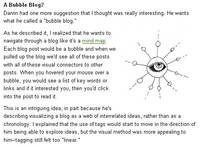Taking part in the 31-days-to-a-better-blog challenge has got me reflecting on why I'm blogging and how I should approach writing a blog post. So, as an aid to that exploration, I've tried to set out 6 principles for this blog – which are listed below.
What do you think of these principles? Do you have any written, or unwritten, rules or principles that you use to guide your blogging?
Principles for Tim's Blog (Draft version – August 2007)
1) A space for focused sharing
One of my key motivations for starting this blog was to provide a space to share reflections, resources and content that I come across or create in the course of my work. The aim is not, however, for it to be a brain dump, or a virtual equivalent of that pile of papers and articles on my desk that I thought someone-or-other would be really interested in. The aim is for shared content that supports thinking and action in relation to social justice and young people's empowerment.
I'll be seeking to make sure that, where I have relevant information, resources or reflections that could be useful to the audience of this blog, I take the time to post these in an accessible and useful way.
2) Not too much on technology
It's very easy in the blogging world to write about technology and social media in particular (I suppose many writers write about writing a lot, so it seems relatively natural). However, this isn't a space for me to reflect on the latest and greatest new technologies I've just come across unless those technologies link to the youth participation and social change elements of this blog.
3) Seeking solutions not problems
I approach the world with a very 'problem-solving' approach. I'm always looking for constructive solutions. However, the key to problem-solving is understanding the problem. That can mean that quite a bit of a blog post is taken up explaining problems – things that are wrong and need fixing.
I'll be seeking to ensure that the emphasis in these posts in on exploring solutions and positive change – and I'll working to escape the temptation to spend all my words ranting about problems.
4) Recommending and reflecting
At times, I recognize that solutions are not easily in reach, and what is needed is not a recommended recipe for resolution, but open reflection on possible ways to respond to a problem or challenge (whether with action or not).
I'll be seeking to have a balance of reflective posts that leave threads and ideas hanging, awaiting more thought – and other posts that seek to weave threads of thought together into something more of a solid thought process that leads to take-away-product of some form.
5) Engaging in conversation
This blog is not one-way publishing. I don't want to just stick content online and leave it there. So I'll be seeking to make sure I use this as a space both for hosting conversation, and for responding to conversations elsewhere in the blogosphere and beyond.
6) A personal blog
This is a personal blog. I have a relatively introverted personality. However, as these posts are shaped by my thinking and interests, I need to be transparent about these and to avoid the comfort of anonymous abstract writing in favor of an honest and open style.
I'll be seeking to strike a balance between relating everything to some personal story, and being clear that as the writer, I am part of the posts I write and shouldn't edit myself out of them.


 One I've been particularly struggling with is a 1/2 finished post on visualisations. Particularly on ways of taking RSS feeds and managing the information in more visual ways (perhaps in mind-mapped ways like the
One I've been particularly struggling with is a 1/2 finished post on visualisations. Particularly on ways of taking RSS feeds and managing the information in more visual ways (perhaps in mind-mapped ways like the  I'm interested in whether the 31-day-challenge approach could be adopted for organisational learning and change programmes (I'm going to be supporting a number of organisations on learning journeys to engage with social media this autumn) – but I'm worried that this current challenge eats up too much time to fit easily into the work day of busy teams.
I'm interested in whether the 31-day-challenge approach could be adopted for organisational learning and change programmes (I'm going to be supporting a number of organisations on learning journeys to engage with social media this autumn) – but I'm worried that this current challenge eats up too much time to fit easily into the work day of busy teams.